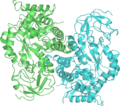Glycolysis: Difference between revisions
CSV import |
CSV import |
||
| Line 40: | Line 40: | ||
{{stub}} | {{stub}} | ||
<gallery> | |||
File:Aerobic_respiration_summary.jpg|Aerobic respiration summary | |||
File:Glycolysis_Summary.svg|Glycolysis summary | |||
File:Glycolysis.svg|Glycolysis | |||
File:Metabolism_of_common_monosaccharides,_and_related_reactions.png|Metabolism of common monosaccharides and related reactions | |||
File:Eduardbuchner.jpg|Eduard Buchner | |||
File:Otto_Fritz_Meyerhof.jpg|Otto Fritz Meyerhof | |||
File:Hexokinase_B_1IG8_wpmp.png|Hexokinase B structure | |||
File:Phosphofructokinase_6PFK_wpmp.png|Phosphofructokinase structure | |||
File:Pyruvate_Kinase_1A3W_wpmp.png|Pyruvate kinase structure | |||
</gallery> | |||
Latest revision as of 12:22, 18 February 2025
Glycolysis is a metabolic pathway that is found in the cytoplasm of cells in all living organisms and does not require oxygen (anaerobic). This process converts glucose into pyruvate, and generates small amounts of ATP (energy) and NADH (reducing power). It is the foundation of both aerobic and anaerobic cellular respiration.
Overview[edit]
Glycolysis is a sequence of ten enzyme-catalyzed reactions. The overall reaction can be expressed as:
Glucose + 2 NAD+ + 2 ADP + 2 Pi → 2 pyruvate + 2 NADH + 2 ATP + 2 H+ + 2 H2O + heat
Stages of Glycolysis[edit]
Glycolysis is divided into two parts:
1. The first part prepares the six-carbon ring of glucose for cleavage into two three-carbon sugars. ATP is invested in the process during this half to energize the separation.
2. The second half of glycolysis extracts ATP and high-energy electrons from hydrogen atoms and attaches them to NAD+.
Regulation of Glycolysis[edit]
Glycolysis is tightly controlled by three enzymes: hexokinase, phosphofructokinase, and pyruvate kinase. These enzymes are regulated in a reciprocal manner to the enzymes for gluconeogenesis, thus ensuring that both pathways are not active at the same time.
Clinical Significance[edit]
Defects in glycolysis can lead to different types of diseases. For example, in humans, genetic diseases caused by the malfunction of glycolytic enzymes may affect the function of various systems.










